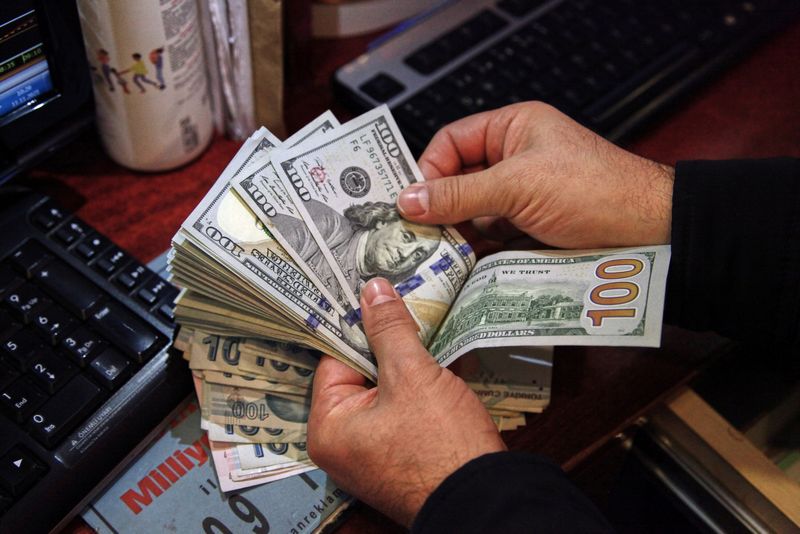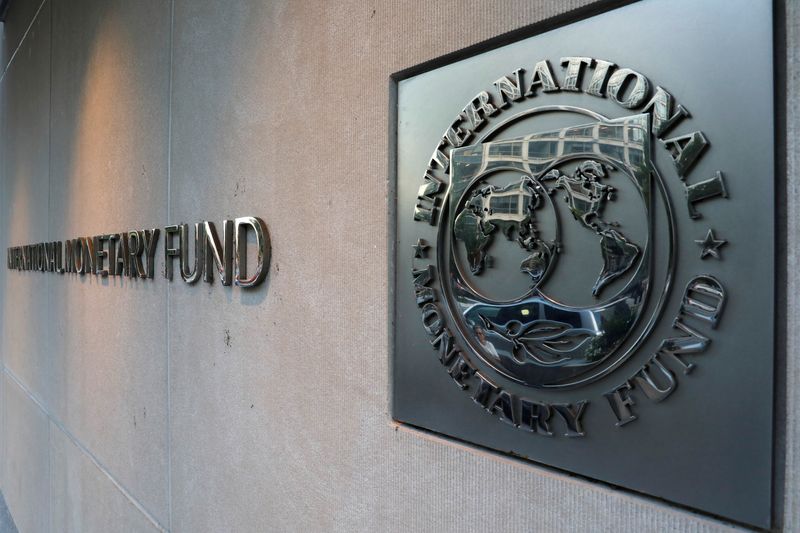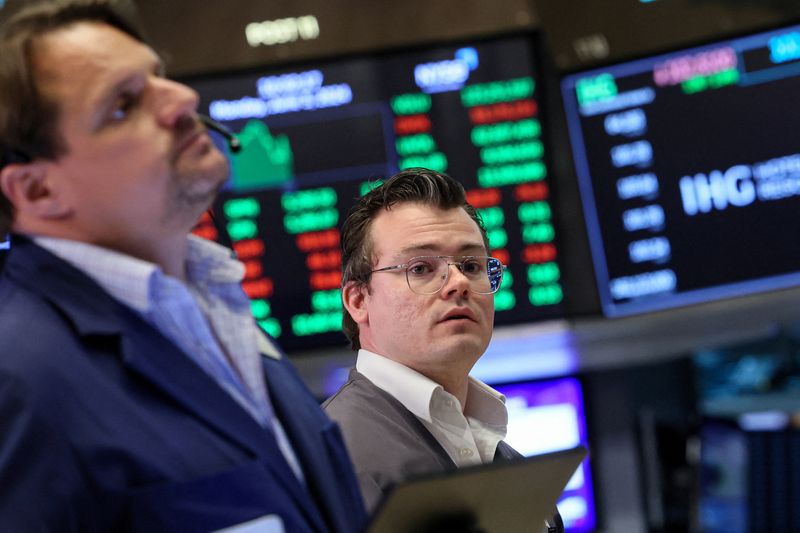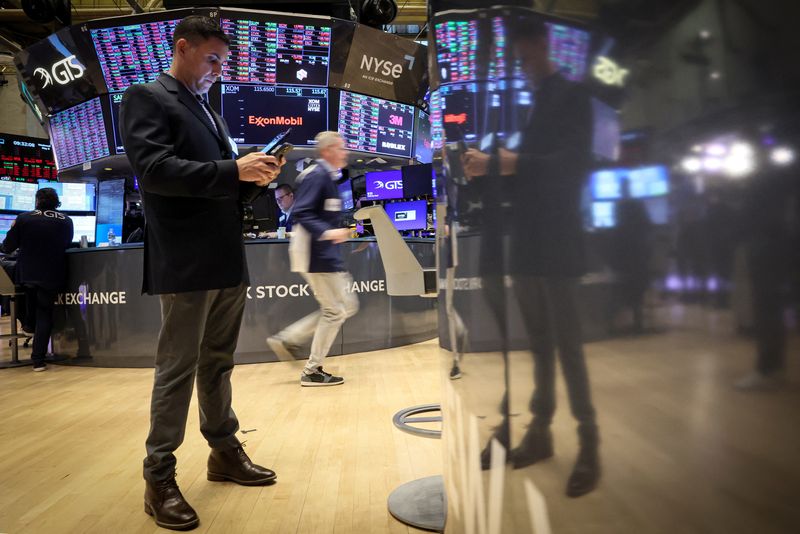Select Language

By Howard Schneider and Ann Saphir
WASHINGTON (Reuters) -The Federal Reserve held interest rates steady on Wednesday and pushed out the start of rate cuts to perhaps as late as December as policymakers sketched out their view of an economy that remains virtually unchanged across its major dimensions for years to come.
With growth and unemployment lodged at levels better than the U.S. central bank considers sustainable in the long run, Fed Chair Jerome Powell said policymakers were content to leave rates where they are until the economy sends a clear signal that something else is needed - through either a more convincing decline in price pressures or a jump in the unemployment rate.
So far, Powell noted in a press conference after the end of a two-day policy meeting, inflation had fallen without a major blow to the economy, and he said there was no reason to think that can't go on.
"These dynamics can continue as long as they continue," Powell said. "We've got a good strong labor market. We think we've been making progress toward the price stability goal. We're asking ... is our policy stance about right? And we think yes, it's about right."
The result is the Fed accepting a slow expected decline in inflation back towards its 2% target, with the central bank's preferred inflation measure - the personal consumption expenditures (PCE) price index - virtually unchanged at the end of this year from its current level and the number of rate cuts held to a single quarter-percentage-point reduction.
Those rate reductions are projected to gather pace next year, with Powell deferring on the timing.
"We don't make decisions about future meetings until we get there," he said. "Really, it's going to be not just the inflation readings. It's going to be the totality of the data, what's happening in the labor market, what's happening with the balance of risks, what's happening with the forecasts, what's happening with growth. You're looking at all of that."
Inflation data published hours before the release of the policy statement and updated projections showed the consumer price index (CPI) rose not at all on a month-to-month basis in May, causing some analysts to argue the latest projections were already "stale."
Powell's characterization of the inflation projections as "kind of conservative" indicated the Fed chief was "keeping the door very much open to a September cut" if inflation continues to weaken, said Krishna Guha, vice chairman of Evercore ISI.
Investors in contracts tied to the Fed's benchmark interest rate largely kept bets intact that the central bank would approve quarter-percentage-point reductions in September and December.
Powell himself said the decision about the rate path was a "close call" for many policymakers, and that to some degree the Fed had merely traded an earlier start to rate reductions this year by tacking an additional anticipated cut onto 2025.
Still, he called the decision to start policy easing "consequential," and the drop in expectations for this year completes a broad swing in sentiment from just six months ago when policymakers in their December 2023 forecasts envisioned an imminent kickoff to three years of steady rate reductions.
Under the current projections, absent a surprise in upcoming inflation or jobs data, the cuts would likely not begin until December, moving the Fed's decision out of the Nov. 5 U.S. presidential election cycle.
HIGHER NEUTRAL RATE
The policy statement issued on Wednesday combined an acknowledgement of "modest further progress" on inflation in recent months with a restatement of language that rate reductions won't be appropriate until officials have "gained greater confidence" that price pressures will continue to ease.
The PCE price index increased at a 2.7% annual rate in April; the median projected by policymakers for the end of the year is 2.6%, with a full return to the 2% target in 2026.
The weak CPI number for May was "only one reading," Powell said. "When we are (more confident), then we can look at loosening policy."
The S&P 500 and Nasdaq Composite stock indices closed sharply higher on the day, while the U.S. dollar and yields on U.S. Treasuries fell.
"The market cares more than the economy does about whether there are two cuts this year or only one," said Brian Jacobsen, chief economist at Annex Wealth Management. "The Fed is basically rearranging the rate-cut deck chairs" from 2024 to 2025.
The new Fed projections show the economy is still expected to grow at a slightly above-trend 2.1% this year despite a sluggish first quarter, and the unemployment rate will remain at its current 4% through the year.
"Recent indicators suggest that economic activity has continued to expand at a solid pace. Job gains have remained strong, and the unemployment rate has remained low," the Fed said in its statement, which was approved unanimously.
Along with trimming the number of rate cuts expected this year, the new rate projections raised the long-run "neutral" rate needed to keep inflation in check while maintaining steady growth to 2.8% from 2.6%.
The long-run rate has now moved up more than a quarter of percentage point over the Fed's last two sets of projections, a possible sign officials feel inflation will be harder to tame in the future.
Powell said the increase in the long-run rate did not necessarily influence officials' short-run projections for the benchmark interest rate, but noted they were still mulling just how restrictive monetary policy had become.
The Fed raised rates aggressively in 2022 and 2023 to curb inflation that had surged to a 40-year high in the aftermath of the COVID-19 pandemic.
"We're making policy with the economy that we have, with the distortions that we have," Powell said. "The question of how restrictive this policy has become is one that everyone's asking ... I think the evidence is pretty clear. This policy is restrictive and is having the effect we would hope for."

BANGKOK (Reuters) - Thai consumer confidence dropped for a third straight month in May, falling to its lowest level since October last year on concerns over a slow economic recovery and political uncertainty, a survey showed on Thursday.
The consumer index of the University of the Thai Chamber of Commerce fell to 60.5 in May from 62.1 in April, the university said in a statement.
Thai courts will convene on a trio of politically charged cases next week, including one that could potentially lead to the prime minister's dismissal, increasing the prospect of more government instability in the Southeast Asian country.
Consumers were not confident about whether the economy would recover quickly, especially when the current political situation became uncertain, the university said.
However, consumer confidence was likely to improve if the government sped up budget disbursements and helped stimulate an economic recovery in the second half of this year, it said.
The economy grew 1.5% in the first quarter from a year earlier, slowing from 1.7% growth in the prior quarter, lagging regional peers.
The central bank predicts growth of 2.6% this year, after last year's 1.9% expansion.

By Uditha Jayasinghe and Kanishka Singh
COLOMBO (Reuters) -The International Monetary Fund (IMF) approved the second review of Sri Lanka's $2.9 billion bailout, but the global lender warned the economy remains vulnerable despite signs of recovery and urged Colombo to do more to restructure a hefty debt burden.
In a statement on Wednesday, the IMF said it will release about $336 million to the crisis-hit country and noted that signs of an economic recovery were emerging.
However, in a note of caution, it said the economy "is still vulnerable and the path to debt sustainability remains knife-edged."
The IMF called for a swift finalization of the Memorandum of Understanding (MoU) with the Official Creditor Committee (OCC), which includes key lenders Japan and India, and final agreements with the Export‑Import Bank of China.
Cash-strapped Sri Lanka plunged into its worst financial crisis in more than seven decades in 2022 after its foreign exchange reserves sank to record lows.
A severe dollar shortage in the country sent inflation soaring to a high of 70%, its currency into freefall and the economy into a sharp 7.3% contraction.
The IMF bailout secured in March last year helped stabilise economic conditions somewhat. The rupee currency has risen 7% in recent months and inflation slowed to 0.9% in May, though demand remains soft and the debt restructuring talks are keeping markets on edge.
Approval of the second review "signifies the continued commitment to our economic recovery and growth which is critical in reinforcing economic stability and resilience," Sri Lanka's State Minister of Finance Shehan Semasinghe wrote on platform X.

HONG KONG (Reuters) - China hopes the European Union will seriously reconsider tariffs for Chinese EVs and stop going further in the "wrong direction", according to a commentary in state-backed news Xinhua.
The statement comes after the European Commission said on Wednesday it will impose extra duties of up to 38.1% on imported Chinese electric cars from July.
China has said it would take measures to safeguard its interests.
"In light of their economic structure and sheer size, China and the EU are best served by teaming up on major economic and trade issues," Xinhua said.
"It would be more cost-effective for the EU to draw on China's advantages in order to develop its own EV industry."
Less than a month after Washington announced plans to quadruple duties for Chinese EVs to 100%, Brussels said it would combat excessive subsidies with additional tariffs ranging from 17.4% for BYD (SZ:002594) to 38.1% for SAIC, on top of the standard 10% car duty.
The move comes as European automakers are being challenged by an influx of lower-cost EVs from Chinese rivals. Still, there is virtually no support for tariffs from the continent's auto industry.
German automakers in particular are heavily dependent on sales in China and fear retribution from Beijing. European auto firms also import their own Chinese-made vehicles.
European Commission President Ursula von der Leyen has repeatedly said Europe needs to act to prevent China from flooding the bloc's market with subsidised EVs.
Trade and economic relations between the EU and China are at an important crossroads, and it is crucial for the EU to demonstrate a strategic and long-term vision, Xinhua said.
The regional bloc seemed to have left some room for the two sides to continue their consultations to find a proper solution and avoid the worst scenario, the commentary added.
"It is hoped the EU will make some serious reconsideration and stop going further in the wrong direction."

By Caroline Valetkevitch
NEW YORK (Reuters) -The S&P 500 and Nasdaq posted record closing highs for a third straight day on Wednesday after inflation data came in softer than expected but the indexes ended off the day's highs as the Federal Reserve projected only one interest rate cut this year.
The Fed's March projections included three quarter-percentage-point reductions. The U.S. central bank, in a statement at the end of its June 11-12 meeting, also said it left its policy rate unchanged, as expected.
Stocks were choppy following the news and press conference with Fed Chair Jerome Powell, with the S&P 500 and Nasdaq paring gains late and the Dow finishing near flat.
Stocks opened higher after the Labor Department reported that the U.S. Consumer Price Index was unexpectedly unchanged in May due to cheaper gasoline.
"The CPI number was certainly cooler than estimates and drove optimism to start the day but that was only half of today's menu," said Michael James, managing director of equity trading at Wedbush Securities in Los Angeles.
James said he would have expected the market to end weaker after the Fed's update, noting that "the commentary was hawkish and rate cut (expectations) were trimmed from three to one."
Oracle (NYSE:ORCL) shares jumped 13.3%, lifting the market, after the software provider forecast double-digit revenue in fiscal 2025 after the bell on Tuesday.
The Dow Jones Industrial Average fell 35.21 points, or 0.09%, to 38,712.21. The S&P 500 rose 45.71 points, or 0.85%, to 5,421.03 and the Nasdaq Composite advanced 264.89 points, or 1.53%, to 17,608.44.
Just after the CPI report, traders boosted bets for a Fed rate cut by September and another by December.
Apple (NASDAQ:AAPL)'s shares climbed 2.9%, extending Tuesday's strong gains, and the company briefly once again became the world's most valuable, dethroning Microsoft (NASDAQ:MSFT) from the top spot.
Volume on U.S. exchanges was 11.80 billion shares, compared with the 12.74 billion average for the full session over the last 20 trading days.
Advancing issues outnumbered decliners on the NYSE by a 2.86-to-1 ratio; on Nasdaq, a 1.78-to-1 ratio favored advancers.
The S&P 500 posted 39 new 52-week highs and two new lows; the Nasdaq Composite recorded 99 new highs and 80 new lows.

(Reuters) -The European Commission will notify car makers on Wednesday that it will provisionally apply additional duties of up to 25% on imported Chinese electric vehicles from next month, the Financial Times reported, citing people familiar with the matter.
Analysts have said they expect tariffs of between 10% and 25% on Chinese EVs, a move likely to prompt possible retaliation from Beijing. The European Commission has said Chinese EVs receive excessive subsidies.
The EU and China's foreign affairs ministry did not immediately respond to Reuters' requests for comment.
Less than a month after Washington quadrupled duties for Chinese EVs to 100%, Brussels is expected to set almost certainly far lower tariffs for imports from Chinese makers such as BYD (SZ:002594) and Geely as well as Western producers such as Tesla (NASDAQ:TSLA) that export cars from China to Europe.
BYD, Geely, SAIC and Tesla did not immediately respond to Reuters' queries on the report.
The move comes as European automakers are being challenged by an influx of lower-cost EVs from Chinese rivals.
China has rebuked the EU over the anti-subsidy investigation, urged cooperation and lobbied individual EU countries, but not fully spelt out what its response to tariffs would be.

By Stella Qiu
SYDNEY (Reuters) -Asian stocks edged up, helped by the technology sector, while the dollar held firm on Wednesday ahead of a key U.S. inflation report and Federal Reserve policy decision that would determine the near-term outlook for interest rates.
European markets are also set to open slightly higher, with EUROSTOXX 50 futures up 0.3% and the FTSE futures gaining 0.4%. S&P 500 futures and Nasdaq futures turned 0.1% higher in Asia.
MSCI's broadest index of Asia-Pacific shares outside Japan rose 0.3%, while Japan's Nikkei slid 0.5%. Technology shares in the region outperformed, with MSCI Asia-Pacific ex-Japan IT index up 1.8%.
Overnight on Wall Street, Apple (NASDAQ:AAPL) surged 7% to a record high a day after it unveiled new AI features meant to rekindle demand for iPhones. That helped Nasdaq Composite rise 0.9% and the S&P 500 gain 0.3% to record closing highs.
Tech-heavy Taiwan and South Korean shares followed suit with gains of 1.3% and 0.4%, respectively. Chipmaker Taiwan Semiconductor Manufacturing Co jumped 3.2%.
Elsewhere, caution reigned, with still soft price data from China failing to lift sentiment much. Data showed on Wednesday that China's consumer prices fell 0.1% in May from a month earlier, missing forecasts. On an annual basis, they rose 0.3%.
China's blue chips wobbled between gains and losses and were last up 0.1%, while Hong Kong's Hang Seng index fell 1.1%, weighed by a 20% plunge in China Evergrande (HK:3333) New Energy Vehicle Group, after the unit of developer China Evergrande warned of losing assets.
Focus is now turning to the U.S. CPI data later in the day, which is forecast to rise a slim 0.1% in May from a month earlier, but with the core up 0.3%.
"The countdown is on, with the market going into full risk management mode," said Chris Weston, head of research at Pepperstone. "There aren't a whole lot of reasons to jump in and support the opening weakness either, so we could easily see further selling on open."
"I like to use U.S. core CPI m/m as my simple playbook guide, so any number that rounds to 0.2% m/m could offer relief in risk markets and bring out USD sellers, while a number that rounds to 0.4% could see U.S. two-year yields rise and with it the USD comes in hot."
In the currency markets, the dollar index has maintained all of its post-payrolls gains since Friday, standing tall at 105.26 against its major peers.
The euro was nursing heavy losses at $1.0737, down for a fourth straight session, amid political turmoil brought about by far right gains in European elections and the snap election in France.
Hours after the release of the U.S. CPI data, the Fed is considered certain to hold steady at its policy meeting, but the focus is on whether it keeps three rate cuts in its "dot plot" projections for this year.
Futures imply 39 basis points of Fed easing for this year, equivalent to just one and a half cuts.
Treasuries, which rallied overnight on the robust result of a 10-year Treasury auction, steadied. The 10-year yield held at 4.4079%, after falling 7 bps the previous session.
"Treasuries will react to the dot plot and possible dovish lean from Powell with a modest bull steepening. However, continued range trading is likely given ongoing "data dependent" outlook," said analysts at TD Securities.
Oil prices extended gains for a third straight session. Brent futures rose 0.5% to $82.36 a barrel, while U.S. crude futures gained 0.7% to $78.45 a barrel.
Gold prices edged 0.1% lower to $2,313.72 per ounce.

By Ashitha Shivaprasad and Brijesh Patel
SINGAPORE (Reuters) - Demand for gold in Asia is surging despite prices hovering near the record highs it hit in May, industry officials say, as buyers snap up the metal to hedge against geopolitical and economic uncertainty.
Spot gold is trading a little over $2,300 per ounce, up about 12% year-to-date and only about 6% shy of the record high it hit last month.
Lower confidence in other investment options, such as real estate and equities, is also a factor behind the demand for gold, analysts say.
"When the macro-economic backdrop returns to normal, when real estate and equities are more interesting, I think that price sensitivity will return," Ruth Crowell, chief executive of the London Bullion Market Association, told Reuters.
In Japan, there are more gold bulls than bears despite record high prices, according to Bruce Ikemizu, chief director of the Japan Bullion Market Association.
Chinese investors grappling with currency devaluation, a protracted real estate downturn and trade tensions are also finding value in gold, experts said. China's purchases of gold coins and bars surged 27% in the first quarter of this year.
"The trend in the market has been that if the consumer wants to buy gold, they will. The price doesn't matter," Albert Cheng, CEO of the Singapore Bullion Market Association, told Reuters on the sidelines of the Asia Pacific Precious Metals Conference.
Elsewhere in Asia, retail investors have been pouring money into the safe-haven asset, with the metal finding increased acceptance among younger buyers.
In Thailand, there were queues outside gold stores as soon as there were headlines on higher prices, said Nuttapong Hirunyasiri, the CEO of MTS Gold Group.
Vietnam is seeing investors flocking to stock up, despite domestic prices trading at stubbornly high premiums to global prices.
On the other hand, India and Australia remain sensitive to high prices.
Indian gold prices have traded at a discount to international prices for five straight weeks, reflecting tepid demand in the second largest bullion consumer, while the Perth Mint's gold product sales in May fell 30% on a monthly basis. [GOL/AS]
India's gold imports in 2024 are expected to fall by nearly a fifth, as record high prices have pushed retail consumers to exchange old jewellery for new items instead of buying afresh.

By Caroline Valetkevitch
NEW YORK (Reuters) -The S&P 500 and Nasdaq registered record closing highs for a second straight day on Tuesday, helped by a gain of more than 7% in Apple shares (NASDAQ:AAPL), while investors also awaited consumer prices data and a policy announcement from the Federal Reserve.
Apple shares jumped 7.3% to a record-high close and gave the S&P 500 and Nasdaq their biggest boosts after the stock declined in the previous session.
At its annual developer event that kicked off on Monday, Apple unveiled new artificial-intelligence features meant to increase the appeal of its devices, including an improved Siri virtual assistant that can answer a wider range of queries and accomplish more complicated tasks than earlier.
The S&P 500 technology index climbed 1.7% and also posted a record closing high.
The Consumer Price Index report will be released before the bell on Wednesday, and the U.S. central bank's policy announcement is due later the same day.
The central bank is likely to leave interest rates unchanged but will release its updated economic projections and "dot plot," which shows where policymakers expect interest rates to stand this year and longer-term.
"Everybody is feeling uneasy, but the data and actions consumers are taking continue to point toward resiliency, and that tends to be overall fairly bullish," said Oliver Pursche, senior vice president and adviser for Wealthspire Advisors in Westport, Connecticut.
The Dow Jones Industrial Average fell 120.62 points, or 0.31%, to 38,747.42, the S&P 500 gained 14.53 points, or 0.27%, to 5,375.32 and the Nasdaq Composite added 151.02
Friday's U.S. monthly jobs report was stronger than expected. Markets have dialed back expectations for the Fed's first rate cut happening in September, now pricing in about a 50% chance, according to the CME's FedWatch tool.
General Motors (NYSE:GM) gained 1.35% after the automaker announced a $6 billion share buyback plan. GM also cut its annual EV production forecast.
After the closing bell, Oracle (NYSE:ORCL) shares rose 8% following the release of quarterly results. The stock ended the regular session down 0.5%.
Declining issues outnumbered advancing ones on the NYSE by a 1.52-to-1 ratio; on Nasdaq, a 1.17-to-1 ratio favored decliners.
The S&P 500 posted 19 new 52-week highs and 4 new lows; the Nasdaq Composite recorded 45 new highs and 127 new lows.
Volume on U.S. exchanges was 10.65 billion shares, compared with the 12.83 billion average for the full session over the last 20 trading days.

By David Lawder
WASHINGTON (Reuters) - The World Bank on Tuesday said the U.S. economy's stronger-than-expected performance has prompted it to lift its 2024 global growth outlook slightly but warned that overall output would remain well below pre-pandemic levels through 2026.
The World Bank said in its latest Global Economic Prospects report that the global economy would avoid a third consecutive drop in real GDP growth since a major post-pandemic jump in 2021, with 2024 growth stabilizing at 2.6%, unchanged from 2023.
That's up 0.2 percentage point from the World Bank's January forecast, largely on the strength of U.S. demand.
"In a sense, we see the runway for a soft landing," World Bank Deputy Chief Economist Ayhan Kose told Reuters in an interview, noting that sharply higher interest rates have brought down inflation without major job losses and other disruptions in the U.S. or other major economies.
"That's the good news. What is not good news is that we may be stuck in the slow lane," Kose added.
The World Bank forecast global growth of 2.7% in both 2025 and 2026, a level well below the 3.1% global average in the decade prior to COVID-19. It also is forecasting that interest rates in the next three years will remain double their 2000-2019 average, keeping a brake on growth and adding debt pressure to emerging market countries that have borrowed in dollars.
Countries representing 80% of the world's population and GDP output will see weaker growth through 2026 than they had prior to the pandemic, the report said.
"Prospects for the world's poorest economies are even more worrisome. They face punishing levels of debt service, constricting trade possibilities and costly climate events," said World Bank Chief Economist Indermit Gill, adding that those countries will continue to require international assistance to fund their needs.
The report contains an alternative "higher-for-longer" interest rate scenario, in which persistent inflation in advanced economies keeps interest rates about 40 basis points above the lender's baseline forecast, cutting 2025 global growth to 2.4%.
U.S. BUOYANT
Strong demand and higher inflation readings in the U.S. have delayed expectations for Federal Reserve rate cuts, and the U.S. economy is defying predictions of a downturn for the second year in a row, according to the report. The World Bank is now forecasting 2.5% U.S. growth for 2024 - matching the 2023 pace - and up sharply from the January forecast of 1.6%.
Kose said the U.S. upgrade accounts for about 80% of the added global growth since the January forecast.
The World Bank also upgraded China's 2024 growth forecast to 4.8% from 4.5% in January, largely on the back of increased exports that have offset soft domestic demand. But it forecast China's growth will fall to 4.1% in 2025 amid weak investment and consumer confidence and an ongoing property-sector downturn.
India also saw a forecast upgrade for 2024 to 6.6% from 6.4% in January amid strong domestic demand.
The World Bank cut Japan's 2024 growth forecast to 0.7% from 0.9% due to weak consumption growth and slowing exports and stabilizing demand for tourism. It left its 2024 eurozone forecast unchanged at 0.7% amid the bloc's continued difficulties with high energy costs and weaker industrial output.
CONFLICT RISKS
In addition to the higher-for-longer rate scenario, the World Bank said the biggest downside risks to the global outlook included greater spillovers from armed conflicts in Gaza and Ukraine.
A wider war in the Middle East could cause further disruptions to shipping and push up oil prices and inflation. Likewise, more uncertainty about the path of Russia's invasion in Ukraine could also disrupt markets for oil and grains, while choking investment into neighboring countries, the bank said.
Increasing trade restrictions driven by geopolitical rivalries also could hamper the recovery of global trade volume growth, which was barely perceptible last year at about 0.1%. The World Bank forecast a rebound to 2.5% in 2024, up from 2.3% in the January forecast.
But it said rising protectionism and industrial policies in many countries could lead to more inefficiencies in global supply chains and reduce investment into emerging market and developing countries.
The World Bank also said a deeper downturn in China, the world's second-largest economy, would hamper growth, especially in commodity exporters and trade-intensive economies.
On the upside, the World Bank said that the U.S. could continue to surpass expectations, boosting global growth with lower inflation if elevated productivity and labor supply due to immigration prove persistent. Lower inflation globally, supported by productivity gains, improved supply chains and easing commodity prices, could prompt central banks to cut interest rates more quickly than now expected, boosting credit growth, the bank added.

